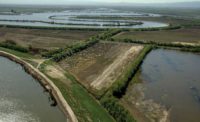A new financial analysis of California’s ambitious but controversial Delta Conveyance Project indicates it would create billions of dollars in benefits even though the price tag has increased substantially. The massive tunnel project, California's largest water infrastructure project in decades, would net economic benefits more than double its costs, according to state officials.
In a benefit-cost analysis released on May 16, the California Department of Water Resources (DWR) estimated that the Delta Conveyance Project will result in an overall economic benefit of $38 billion, most of it coming from increased reliability of urban water supply.
According to an update from the project’s design and construction authority, the estimated cost is now $20.1 billion, 25% more than a 2020 assessment. California officials say the increase is in line with inflation and increased construction costs due to changes in the program over the past four years. Moreover, the authority said that a preliminary value engineering exercise showed “there is genuine potential for a significant cost reduction of about $1.2 billion even at this early stage of project development.”
The project will provide a second route to divert water through a 45-mile-long tunnel from the Sacramento River in northern California into the State Water Project (SWP) distribution and storage network in the arid south.
Reducing Water Supply Shortages
The project’s environmental impact report estimates construction costs at $17.3 billion, yielding a ratio of $2.20 in benefits for every $1 in costs.
“The primary benefit of the DCP is that it would reduce the anticipated increase in the frequency of water supply shortages for SWP’s urban contractors caused by climate change and sea-level rise,” DWR said, referring to public water agencies that contract with the SWP.
The project will also improve the reliability of agricultural water supply, the average quality of water exported south of the San Francisco Bay/Sacramento-San Joaquin Delta, and reliability in case of earthquakes, according to the state.
“The Delta Conveyance Project passes the benefit-cost test readily, with benefits that are more than double the cost,” David Sunding, a professor at the University of California, Berkeley, who led the analysis, said in a statement.
The Bay-Delta is a key watershed, providing water for 27 million Californians and 750,000 acres of farmland. About 56% of deliveries from the State Water Project currently supply urban areas, while nearly 44% go to agriculture.
Project Opposition
The DWR granted approval for the project in December 2023. Project opponents have challenged the approval in at least nine lawsuits, arguing that, among other things, the project will dramatically reduce river flow to the environmentally sensitive Delta and harm Delta smelt, Chinook salmon and other imperiled fish.
In addition, two Native American tribes have asked the U.S. Environmental Protection Agency to withhold federal permits and approvals for major water export infrastructure in the Bay-Delta, including the DCP, alleging that California’s regulation of water quality in the Delta is a form of environmental racism.
In the benefit-cost analysis, DWR said the benefits from improved urban water supply reliability would be worth more than $33.3 billion of the total benefits. “The DCP would increase SWP deliveries by approximately 17% … largely offsetting the anticipated reduction in water deliveries due to climate change,” the department said.
“Twenty-seven million people rely on these surface water supplies that support a $2.3 trillion economy in California.” said DWR Director Karla Nemeth. “There is a very real cost to doing nothing. It is vastly more efficient and economical to avoid declining supplies.”



